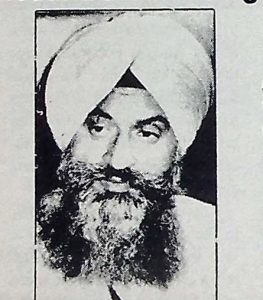Says Jathedar Darshan Singh Khalsa
AMRITSAR, India: All hopes of unity of the entire Sikh community, not merely between the Akali groups and the militant organizations, have come to rest on one person today Mr. Darshan Singh. Since his taking over as the Acting Jathedar of Akal Takht, Mr. Darshan Singh has also made it his prime duty to bring together the disparate elements in the community in a move to bring them together under one banner the Panth. He has been contacting groups and individuals even as people are daily pouring into the Akal Rest House inside the Golden Temple complex in Amritsar to hear him and give him their views. The man who has made an indelible impression on the Sikh psyche in recent times by his kirtans Mr. Darshan Singh is a graduate in music from Allahabad looks poised to become the rallying point for the Sikh masses who are in desperate search of credible and dynamic leadership. Mr. Darshan Singh is apolitical and yet he is free from any trace of obscurantism. Answering wide range of questions the Jathedar asserted that treating Sikhs as slaves has given birth to demand for Khalis tan. Some of the questions and answers are being reproduced here.
Question: Are you in favor of a hukamnama being issued from Akal Takht against the killing of
innocent people in Punjab? Answer: I have been wondering why my predecessor has been silent on this issue which has been raised time and again. Anyone who kills an innocent person is not a human being. It is against the basic Sikh tenets for anyone to kill innocent people. But why blame the Sikhs alone? I would sign any hukamnama provided a similar edict is signed! by all the religious heads of other communities. It must read “anyone who kills an innocent person is not a human being”. My signing a hukamnama in isolation would only amount to making Sikhs sacrificial goats. Did the Hindus issue an edict when Sikhs were being killed in Delhi and other places? The Shankaracharya of Jagannath Puri could have issued it.
Question: What is your attitude towards the demand for “Khalistan”.
Answer: The demand for “Khalistan” was nothing but the echo of revolt by Sikh youth, who were convinced that they had been reduced to the status of second-class citizens in the country. If you think that you were being treated like a slave, your mentality would be geared to craving for freedom. It is necessary to understand this state of mind. The Centre must go to the root of the problem and take steps to erase this impression from the minds of Sikh youth. The present policy of divide and rule has not only resulted in the killing of innocent persons but the blame is passed on to the Sikhs as a community.
Question: Don’t you feel that the mixing of religion and politics is the reason for the accentuation of the crisis?
Answer: As far as the Sikhs are concerned religion and politics are inseparable. This does not mean that politics is shaped or influenced by religion. When their religion is attacked the Sikhs naturally feel hurt and this hurt sentiment influences the politics of both the community and the State. Asaragi, I was affected by the events following Operation Bluestar, my shabads were banned and I was arrested. Thus even though I am a religious man through and through my Own activities came to be politicized to this extent.
Question: You called for the withdrawal of the C.R.P.F. from the State. In the context of increased terrorist murders, how can this be Justified?
Answer: The deployment of the C.R.P.F. has not in any way reduced the killing of innocent persons. On the other hand the presence of the C.R.P.F. has added to the tension. What I said at Brahmapura was not so much an ultimatum as an expression of anger of the citizens at the attitude of the Central force. I strongly believe that the withdrawal of the C.R.P.F. will help normalize the situation, especially in the context of the renewed initiative for unity.

Article extracted from this publication >> February 6, 1987